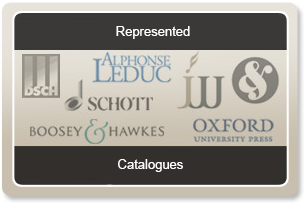News
An Interview with Paweł Łukaszewski
2014-10-29
Karolina Kolinek-Siechowicz: Requiem is a continuation of the funeral theme that is the basis of your earlier compositions. Is the stylistic layer of Requiem similar to that of Vesperae pro defunctis or Salve Regina? Or did you use any new solutions?
Paweł Łukaszewski: I composed Nieszpory żałobne (Funeral Vespers) in 1995, that is almost twenty years ago. Although my attitude and my ideas remained the same, the time distance between these two pieces and what happened during these years, and especially my other compositions (quite a few) undoubtedly had an impact on my work and the development of my language of composing. In this sense Requiem is different, fresh, I hope. It deepens our faith, but also strives for linguistic and stylistic perfection and relevance of the applied solutions.
The work is also your personal tribute to people who were close to you and who passed away recently, e.g. to two composers: Wojciech Kilar and John Tavener who were particularly interested in sacral music. Does Requiem show their influence on your individual style?
A specific link between myself and the composers you mentioned (there are more of them) does not necessarily come from the influence of their work on my style. I did not quote or borrow from their pieces. Dedication in my score is rather an attempt to discover their chosen and followed way, which focused on the spiritual and mystic aspect of composing sacral music.
Requiem was composed on the commission from the Joyful Company of Singers. In one of the latest interviews you say that you have been thinking about working on that musical form for some time. Do you consider yourself a follower of the tradition of composing great funeral masses or you rather propose your own vision of that form?
The composer of the 21st century, who is fascinated with the requiem, can face many obstacles and inconveniences in his search. These might stem from the tradition of earlier periods, when the composers used to create pieces that were intended to mourn the dead. Numerous examples from musical literature can function as a collection of experiences, but they can also become a ballast and limitation. Tradition gave me the tools to think of the theological message of the text, on the basis of the documents of the Catholic Church, and of the message of the funeral liturgy. To start from the beginning, you had to focus on the meaning of death in Christian faith. You cannot relate the modern funeral liturgy to rending your garments, wearing penitential sacks or funeral veils, or rolling in the ash. The habit of lamenting and engaging professional weepers is gone. It was already Saint Cyprian of Carthage (c. 200 or 210-258) who said: "Weep not over the deceased, nor wear black clothes, as the dead are clad in white robes in heaven".
How important are the soloists (soprano and baritone) and what is the role of the orchestra in Requiem? Do the two versions of Requiem: the chamber version that will have its premiere on 24th August in Presteigne and the symphonic one that will be first performed on 31st October in Kraków, differ from each other?
I was commissioned to write a chamber version, with a smaller orchestra, probably due to practical reasons. However, I wanted to enrich it with some wind and percussion instruments, as well as with the piano, hence the expanded instrumentation that adds to the colour and sound of the piece. The vocal part remains the same. Therefore, the piece can be performed both by bigger philharmonic ensembles and by academic or church choirs whose conductors look for a new and interesting repertoire. Two parts: Pie Jesu and In paradisum are composed for soprano solo. The version with the organs was published by PWM Edition.
In the already mentioned interview you emphasise the importance of Psalmus and Alleluja parts. Via Crucis also contains an accent giving hope and optimism: the fifteenth Station of the Cross, Ressurection. You present a joyful vision of the Christian faith in your compositions. Is it also reflected in the character of the music? Are you trying to awaken the listener's hope and trust in God's Will through aesthetic experience?
Universality of the mission of the Church and the goodness of God are the basis for being open and joyful, despite difficulties that we encounter in life. Sacral music deepens our faith and helps in getting an insight into the Mystery. Hope and trust in God's Will come from it. This is the way I understand my mission as a composer.
You believe in a strong relation of sacral music and liturgy. How important is it for you to have your music live among the followers of the Church and those who are not normally interested in contemporary music?
It is every composer’s dream to find recipients for his music. Sacral music has a huge emotional load, but it also serves some other purposes. It is mostly supposed to encourage our reflection and spiritual growth. I think that it can be beneficial for everyone.
Your precede the note about Requiem with a quotation from the pastoral constitution Gaudium et spes. Does studying documents of the Church and deepening knowledge of the truths of faith as part of the process of preparing a new composition affect its form and character?
I always carefully prepare myself for a new composition, I study the subject; it's a specific planning of the form, expression and message, and responsibility towards the matter.











